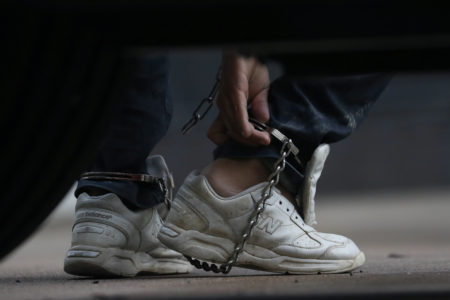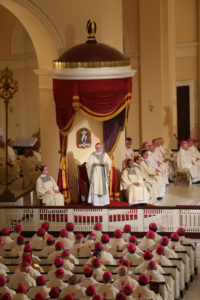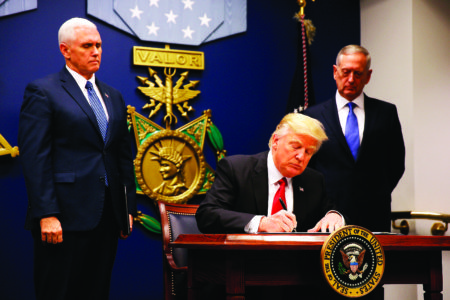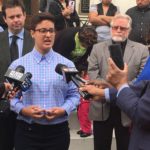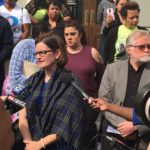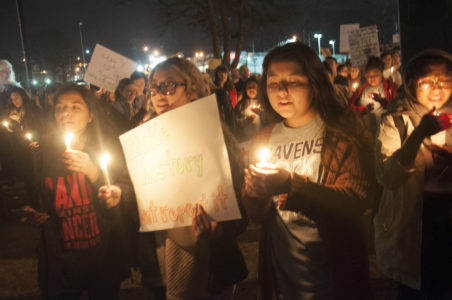Por Obispo Joseph Kopacz
Con la fiesta de la Epifanía celebramos la culminación de la temporada navideña, finalizando oficialmente con el bautismo del Señor el lunes pasado. Estamos bien entrado en el nuevo año, pero esta semana pasada fue notable como la Semana Nacional de Migración designada por los Obispos Católicos Estadounidenses durante más de 25 años. ¿Por qué existe esa conmemoración única en esta época del año? Sigue leyendo por favor.
A lo largo de la temporada de Navidad celebramos, y ojalá hayan experimentado, la gloria de Dios que resplandece en el rostro de Jesucristo. Si es así, hemos seguido una larga línea de casi dos mil años, a la luz de la Encarnación. Comenzando con el anuncio de los ángeles, abrazado con entusiasmo y alegría por los pastores, y resueltamente, buscado por los Magos, los relatos de la Infancia sentaron las bases para todos los discípulos en beneficio de las generaciones venideras hasta el momento presente. San Pablo en la segunda carta a los Corintios, describió esta experiencia para todos los creyentes en la Palabra hecha carne. “Dios ha diseñado de tal manera que su luz brilla en nuestros corazones para darnos la luz de conocer su gloria revelada en la faz de Jesucristo” (2Cor 4,6)
En la historia de la salvación, que se celebra en los relatos de la infancia, la alegría que irrumpe del encuentro con Jesucristo es palpable e irresistible. Cuando alguien encuentra la misericordia de Dios, nosotros, como mujeres y hombres, descubrimos o redescubrimos la esperanza para nuestra vida, alimento para nuestros corazones, mentes y almas. A su vez, esta nueva vida de la salvación está destinada a ser difundida a lo largo y a lo ancho en crecientes círculos por todos los tiempos en comunidades de fe, de esperanza y de amor, de justicia, de paz y de servicio en nuestros hogares y en nuestro mundo.
Pero la historia de la Natividad en la vida de María y de José, también revela la valentía necesaria para permanecer en el sendero de la vida que nos dirige a Dios en este mundo en el rostro de circunstancias difíciles. Más allá de sentimentalismo y observanciones piadosas, tenemos una historia paradigma para todas las familias y personas que se han visto obligadas a abandonar sus casas y hogares. La Virgen María y San José tuvieron que viajar durante los días finales de su embarazo. Cuando llegaron a Belén recibieron un poco de ayuda, y aunque no fue mucha, fue importante. Como extranjeros, no tenian un lugar para quedarse, y el tiempo para el nacimiento del Señor estaba cercano. No fue la intención de San Lucas y Mateo extenderse en las preocupaciones humanas de la Sagrada Familia, pero podemos imaginarnos que las parteras, que todavía están en servicio en nuestro tiempo para la mayoría de los nacimientos en el mundo, ciertamente una estuvo presente para ayudar a María en el parto y recoger a Jose cuando se desplomó sobre la paja. Después de un arduo viaje, el hambre y la sed tenían que pesar sobre estos extranjeros procedentes del resto del mundo, y estamos agradecidos por las personas anónimas que les proporcionaron alimento para el espíritu, mente y cuerpo. Y en esta fiesta de la Epifanía, nos enteramos de que la estrella condujo a los Magos hacia la casa donde María y el niño estaban hospedados. Gracias a la hospitalidad y generosidad de las personas de esa localidad, la Sagrada Familia tuvo un lugar donde estar.
De extranjeros a refugiados, la historia continúa. Tan pronto como los tres Reyes Magos partieron por otro camino, un cambió para siempre, María, José y el niño Jesús tuvieron que huir para salvar sus vidas. Sabemos de la crueldad de Herodes y la matanza de los inocentes, incluyendo a su propio hijo, en su codicia por conservar su poder. Esta históricamente documentado que cuando César Augusto, el emperador que había comenzado todo en movimiento con su mandato del censo, recibió la noticia de la matanza ordenada por Herodes dijo con asombro a tal brutalidad que era mejor ser uno de los cerdos de Herodes (porque los judíos no comen cerdo) a uno de sus hijos.
En ese momento, Jesús, María y José eran refugiados que huyeron a Egipto, donde permanecieron durante dos o tres años. Allí recibieron la hospitalidad de un círculo de personas desconocidas que les permitio vivir, trabajar y crecer en familia. Por último, regresaron a Nazaret, en el norte de Israel, porque el hijo de Herodes era el rey, y la amenaza de muerte era real.
Es evidente que a principios de enero es un momento ideal para estar conscientes de la situación de casi 65 millones de personas en nuestro mundo de hoy, que como la Sagrada Familia se han visto obligados a migrar y/o huir de su tierra y su hogar por una variedad de razones.
El tema para este año de la Semana Nacional de Migración está tomado de una de las expresiones del Papa Francisco, “Crear una cultura de encuentro”. Como los pastores y los Magos, una vez que hemos encontrado a Jesucristo nuestra vida nunca es la misma. Los objetivos de esta semana han permanecido inalterados durante más de 25 dijo con asombro a tal brutalidad, que lo mejor era ser uno de los cerdos de Herodes (porque los judíos no comen cerdo) a uno de sus hijos. En ese momento, Jesús, María y José eran refugiados que huyeron a Egipto, donde permanecieron durante dos o tres años. Aquí reciben la hospitalidad de un círculo de personas desconocidas que les permita vivir, trabajar y madurar como familia. Por último, regresan a Nazaret, en el norte de Israel, porque el hijo de Herodes era el rey, y la amenaza de la muerte era real.
Es evidente que a principios de enero es un momento ideal para crecer en la conciencia de la situación de casi 65 millones en nuestro mundo de hoy, que como la Sagrada Familia se han visto obligados a migrar y/o huir de la tierra y el hogar para una variedad de razones. El tema para este año de la Semana Nacional de Migración está tomado de uno de Papa Francisco’ expresiones de referencia, para crear una cultura de encuentro. Como los pastores y los Magos, una vez que nos hemos encontrado a Jesucristo nuestras vidas nunca son los mismos. Los objetivos de esta semana han permanecido inalterados durante más de 25 años: educar sobre la compleja realidad de la migración, que incluye a los migrantes, los inmigrantes, los refugiados y las víctimas del tráfico de seres humanos, para fomentar una cultura de encuentro en la que las comunidades católicas abren sus corazones y sus manos para darle la bienvenida a los recién llegados, no como extranjeros, sino como miembros del Cuerpo de Cristo, para dar gracias por los muchos en nuestra sociedad que son como aquellos que ayudaron a la Sagrada Familia.
En mis viajes alrededor de la diócesis, y en mi trabajo en Caridades Catolicas, me siento inspirado al ver el desarrollo de los objetivos de la Semana Nacional de Migración. Personas en la iglesia y en todo el estado están sirviendo a las comunidades de migrantes que están aquí legalmente para recoger y procesar los cultivos de los que estamos acostumbrados a disfrutar. Muchos están trabajando para apoyar a quienes han sido víctimas de la trata de personas cuyas historias claman al cielo por justicia y compasión. Los inmigrantes, documentados e indocumentados, están contribuyendo significativamente al bienestar económico y social de nuestro estado y de las comunidades locales, incluyendo a nuestras parroquias en toda la diócesis.
Desde las secuelas de la guerra de Vietnam en los años 70’s, Caridades Católicas, en colaboración con una red de profesionales y personas compasivas en nuestro estado, ha estado acogiendo y sirviendo a menores refugiados no acompañados provenientes de todo el mundo. Estos jóvenes han prosperado, y ahora son ciudadanos productivos de nuestro país.
Dejando de lado la retórica de la reciente campaña presidencial y elección, y la inacción y la insensibilidad de todos los Congresos y presidentes durante décadas, hay muchos en nuestro estado y en nuestro país que están encontrando, acompañando, y se hacen amigos de aquellos que han llegado a nuestras puertas. La Semana Nacional de la Migración es una semana de 52 pero viene a principios del Nuevo año y oramos para que sus nobles objetivos siembren semillas y den frutos a lo largo del año.
A medida que progresa el nuevo año estaremos implementando la renovada Misión, Visión y las prioridades pastorales de la diócesis. En armonía con los objetivos de la Semana Nacional de Migración, os dejo con nuestra visión diocesanas. Para servir a otros _- para abrazar la diversidad – para inspirar el discipulado. Que Dios, que ha comenzado en nosotros la buena obra, la lleve a plenitud en el día de Cristo Jesús.
